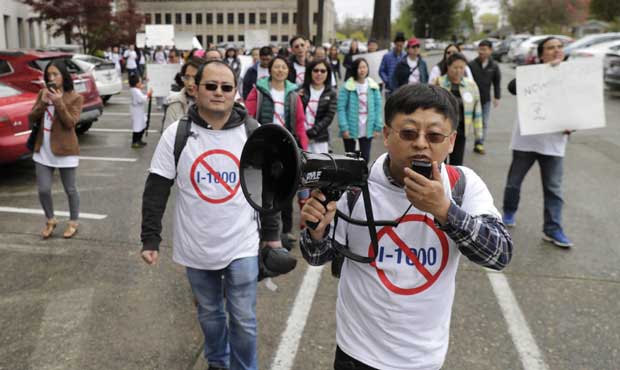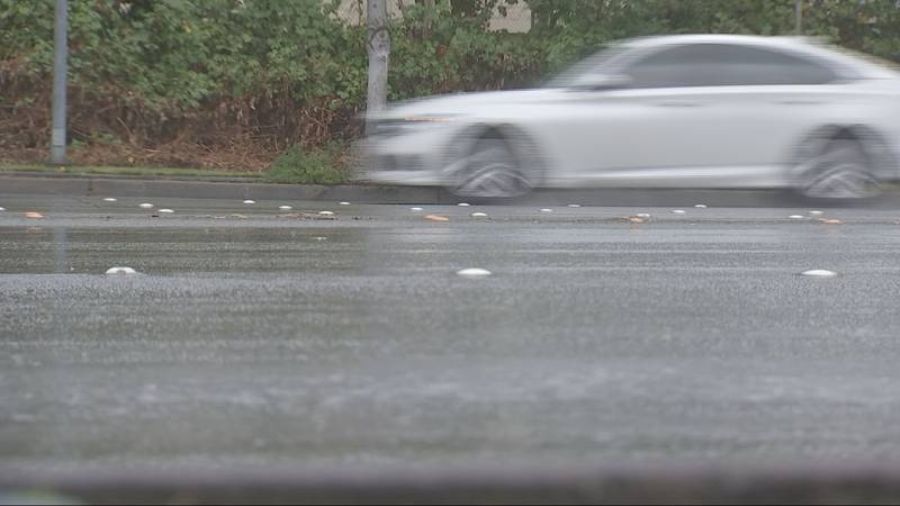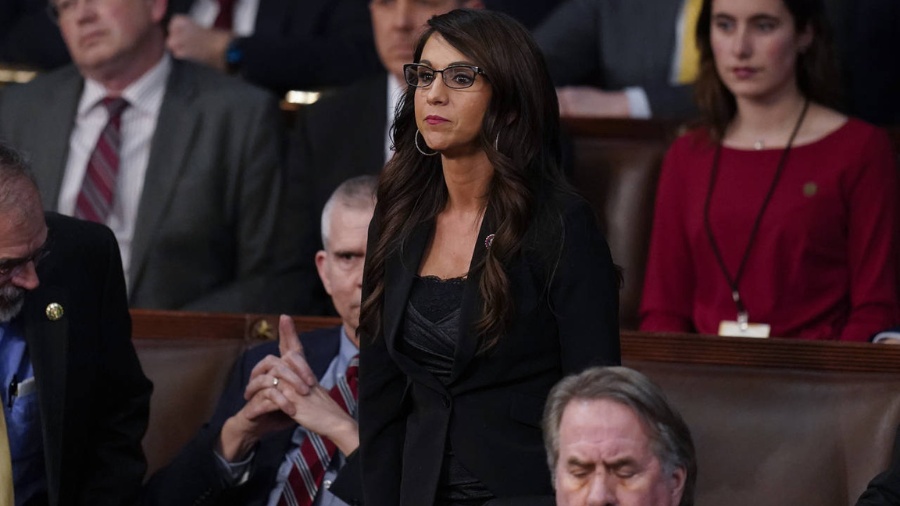Referendum 88: Letting Washington voters decide on affirmative action
May 3, 2019, 7:04 AM | Updated: May 6, 2019, 5:44 am

Protesters opposed to Initiative 1000 chant and march following a joint Washington state House and Senate committee, Thursday, April 18, 2019, at the Capitol in Olympia, Wash. (AP Photo/Ted S. Warren)
(AP Photo/Ted S. Warren)
Kan Qiu knows racism exists in American society. He, and his family, experience it often. Still, he is spearheading the effort to defeat the recently-passed I-1000 — an initiative to lift Washington’s ban on affirmative action.
“We view this Initiative 1000 as divisive,” Qiu told Seattle’s Morning News on KIRO Radio. “It is actually targeted at Asian Americans.”
Based in Bellevue, Qiu is the man behind Referendum 88 which would send I-1000 to Washington voters for the final say. He argues — beyond his opposition to basing regulation on race — that affirmative action regulations will harm the Asian American community.
RELATED: What is in I-1000’s affirmative action plan
RELATED: Could affirmative action head to the ballot?
“I don’t believe in identity politics,” he said. “I believe in working hard and achieving merit. It shouldn’t be based on your race or identity. That does not make sense.”
Racism and discrimination in Washington
Qiu is with the American Coalition for Equality and is also a member of Washington Asians for Equality.
“In this state, there is a dark history with Chinese Americans,” he said. “Back in the 1880s, right after Chinese labor was used to finish the transcontinental railroad, back then, Chinese immigrants were the second largest ethnic group, behind white, in the State of Washington.”
He explains that discrimination was common during those times, with spreading fears of Chinese immigrants stealing jobs. Eventual exclusionary laws were passed, many of which did not allow land ownership for Asian immigrants.
“Because of that government-sanctioned bigotry, the public was more emboldened,” Qiu said. “There were a lot of lynchings and public atrocities committed against Chinese immigrants, right here in Tacoma and Issaquah. There are a lot of incidents like that.”
It’s sensitivity to the region’s racist past, Qiu says, that informs his opposition to affirmative action. That is why he is leading the effort to scale back what the Legislature did last session — pass I-1000. And he aware that his position, as an Asian American, may not align with others from different minorities. He has spoken with others about their support for affirmative action and I-1000.
“They say the whole systematic racism is towards them,” he said. “Nobody is perfect. There are individual people, they have prejudice. But at least at the law level, at the policy level, I cannot find any discrimination … To me, it’s not a problem with the law, it’s a problem with the execution of the law … You are telling people that certain class of people need to be treated different. That’s a very dangerous path.”
Referendum 88
Referendum 88 does not undo I-1000 entirely. Instead, it would send the affirmative action issue to Washington state voters for the final decision. Currently, the initiative was passed by the Legislature on April 28. Referendum 88 was filed with the state on April 29. You can read its text here.
Volunteers are collecting signatures for the referendum. They need about 129,000 signatures to move the referendum forward.
I-1000 overturned 1998’s Initiative 200, which banned affirmative action in Washington. Unlike similar regulations, I-1000 does not require the use of quotas. It states that race, sex, color, ethnicity, national origin, age, sexual orientation, disability, or veteran status can be used as factors when schools and employers are considering applicants. But it bans preferential treatment, so any such characteristics cannot be the sole factor in a hiring decision.
The initiative was supported by One WA Equality Campaign. But Qiu’s organization also hypes equality — Washington Asians for Equality.
Qiu says that I-1000 and its affirmative action regulations would harm the Asian American community.
“This would hurt me and other Asian Americans in the educational (system), maybe for a future in public employment,” he said. “… at UW for example, there is a 25 percent Asian American student body. There are politicians; even a Seattle Times editorial mentioned that they feel like there are too many. We’re over-represented. That’s a scary word to us. Whenever people talk about ‘you are over-represented,’ that means you need to be reduced. That’s kind of scary. It is targeted at Asian Americans.”
Qiu’s relationship with racism may not be that of other minorities. When pressed on how he encounters the issue, he does not speak about the justice system or a history of redlining. He discusses everyday encounters that minorities deal with.
RELATED: How segregation was planned and continues in Seattle
RELATED: Seattle schools more segregated today than decades ago
He argues that systems from the government to the schools are already set up to deal with discrimination. He says he will simply report someone if they are discriminating and in a position of power. If he encounters someone powerless, like a neighbor, he will “just walk away. I’ll never talk to him. I’ll never have any interaction with him. It’s easy.”
“At the individual level, there are incidents of discrimination,” he said. “That is the truth. Even myself … my kid … he was discriminated against when he was in first grade. The other white kids were calling him racist names. Guess what? We reported it to the school, to the principal. Then there were consequences. The parents were called into the office.”
“However, if the government has on the books, discrimination against you, that is harder for any of us to overcome,” he said. “Because the government has immense power over you.”














